At A Glance
Sutton, MA, December 16, 2009
“Be useful” is Leslie Graff’s motto. Because of her training as a child life specialist, her youth in Turkey and her experiences on medical missions with Operation Smile, Leslie is committed to a life of global service and philanthropy, which, she proves, is not just for the wealthy. The sale of Leslie’s skilled paintings help fund her family’s giving.
You are a child life specialist. What does that mean and how did you settle on that discipline?
I received a BS in Elementary Education and a Master’s in Marriage, Family and Human Development with an emphasis in early childhood. Then I went on to do clinical training at Johns Hopkins Hospital to become a child life specialist.
Child life is a clinical subspecialty that provides therapeutic play, psychological preparation and emotional support to children in the face of hospitalization, grief, loss, & trauma. After graduate school, I taught on the early childhood studies faculty at a Ohlone College, and worked as a child life specialist at University of California, San Francisco.
If there is one word that describes me it’s probably “creative” and I’ve always loved painting. It was hard for me to leave art behind during my schooling. I considered going to art school, but I wasn’t ready to abandon my equally loved academic interests. I found ways to merge my creative endeavors with my academic strengths as a child life specialist. It is the perfect fit, my creative skills are very useful in developing good therapeutic activities with patients.
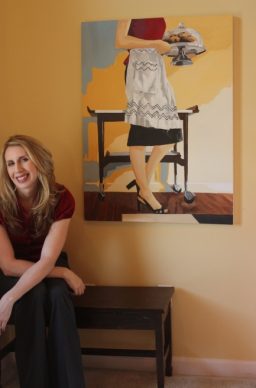
How did you get involved with medical missions through Operation Smile?
I got married right after I finished graduate school and moved to California, and at that point, I felt like I could turn my attention to helping globally and my husband was 100% supportive.
I’ve always had strong feelings about global service. I lived in Turkey for a few years as a child and I think when you spend much time in developing countries it really gives you an understanding that there is a lot we can do to help. I remembered a colleague at Johns Hopkins who was involved with Operation Smile, which is a children’s medical charity treating facial deformities such as cleft lips and cleft palates all around the world. So I looked it up and I saw they had a two-week mission to Kenya. I’d always wanted to go to Africa so I sent them an e-mail asking if they needed a child life specialist in Kenya. They responded, “Actually we do, and we’re leaving in 3 weeks, can you go?” Over the course of that next year I went on medical missions to Kenya, Morocco, the Philippines, and Siberia. That last one I did when I was pregnant with my first child. My role on these missions is basically to provide a playroom for the children pre- and post-op as well as prepare them for the surgeries, help them understand the hospital experience in a child appropriate way, and allay any fears. It is one of the most fabulous jobs around!
When my first son was a couple of years old, the story gets crazy. I was going through recurrent pregnancy loss: I had my one son and then I had seven miscarriages. And so during that really rough period of time, I just needed to do something to get out of my own troubles. So I went back to Morocco on another mission.
We finally figured out why I was having all the miscarriages and I was able to have two more sons. So while my children have been young, I have limited my trips, not wanting to be gone, but now as they are getting bigger, I hope to go every two years or so. I am actually headed on my next mission to Amman, Jordan, in February 2010.
When you started having your own children, were you able to transfer the feelings you had about your medical missions and your academic pursuit of education into the actual practice of motherhood?
When I was about to have my first child, I told my colleagues I was going to be staying home with the baby. They were really surprised by my decision, I was kind of on the fast track, and they said, “Oh, you are going to hate it, you’re going to want to come back to work!” And my response was, “You know, if I can handle being around other peoples’ kids all day, I think I am going to like being with my own!” I’ve always loved being home, some people tend to feel kind of isolated but, I’ve never felt that. I actually thrive on the unstructuredness of it. So it was a really smooth transition for me. Because my field is children and families, motherhood didn’t require me to backburner my interests, it just became a living extension of it. There is a luxury in being home, it provides the flexibility to do things like my art, that I couldn’t if I was busy with work.
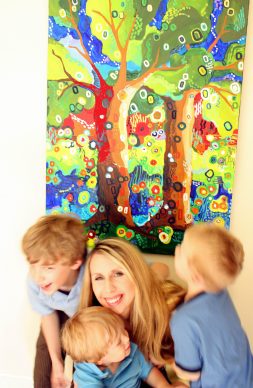
The hardest thing about motherhood was the hiccup in the plan when I was suddenly like, “Wait, I have one child, and now I want two…” and two didn’t happen right way. My whole identity as a mother was kind of stuck, in this place because I didn’t fit with people who had no children, but at the same time I wasn’t in the inner circle of supermoms yet because I just had one.
Those three years when I had my seven miscarriages was the time that I started returning to my art. I just started painting things for my house, but then a woman came to my house for dinner and wanted to buy one of my pieces. That led to showing my pieces in a shop and then having my own solo show… and now a full studio in my house.
Those years of recurrent pregnancy loss were really tough for me. It was a very isolating experience, some people might have a miscarriage or two but when you get up to six and seven you are such a statistical outlier, no one can really relate. It’s hard to resolve having that type of experience. I decided I could use my child life skills to help other women through similar experiences. I led pregnancy loss groups through Resolve, which is an infertility organization. So many times I read peoples stories and they always tell their story when they are at the end of it. It’s always something like, “Looking back, it was hard, but its okay now… we adopted this baby or we eventually had a baby ” But that doesn’t really help people who are right in the middle of it. A person who’s in the middle of a traumatic experience like recurrent pregnancy loss doesn’t really know what the end is going to be. So I thought, I want to help other people who are in the same situation as me now. Not when I’m on the other side, down the road, telling everybody it will all work out. Because you never know how it is going to end up. The strings don’t always tie up neatly.
Aside from leading pregnancy loss groups, I thought about how I could memorialize this really difficult time in my life. I had been trained to work with loss, bereavement, grief, and coping with medical conditions… But I didn’t have a good support system for myself as I was going through these losses. I began to approach coping with my own challenges as I would have with a patient, but in a different development paradigm. So I started devoting more time to my art and creating a world filled with beautiful things. Creating art became a form of generative coping, a therapeutic process for me. Out of this personal tragedy came the decision and opportunity to develop this talent, to say through my art, “We are all going to go through hard things, but we can create beauty and meaning out of it.” I am passionate about painting but I love that I also do it with a purpose. I try to use my art to help others; I use a lot of the money I make from my paintings to fund service projects we do as a family. I donate them to support some of our favorite causes. I’ve often give my paintings as gifts to friends who lost children or gone through other difficult experiences, and in those ways it is a very personal, empathetic sharing. Trials can become gifts, and often the open doors to better things.
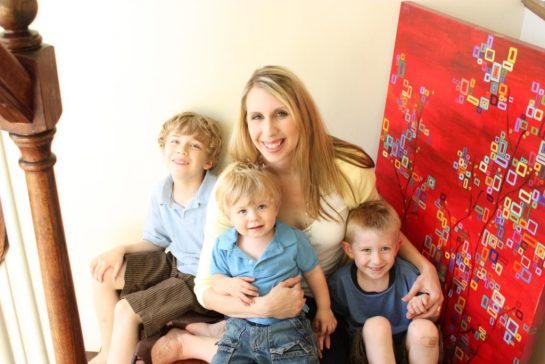
As my art has evolved, I have found more ways to incorporate my voice into my art. My abstract and organic pieces, explore intangible things that are important to me as a woman and a mother: our influence, our relationships, our connections we have with people, other groups explore my feelings on domestic life. So my art renaissance had a very unusual beginning but has a good end.
Did you have a mentor growing up in your own mother or someone else who set an example of a woman who could have a broad influence?
I have extremely supportive parents and my dad was always a big champion of smart girls. My mother is a convert to the Church, and I was born when both she and my dad were both in graduate school. She was getting her Masters degree in maternal child nursing and my dad was getting his law degree and so education was just always a part of our family. My parents adopted my sister and then I was born, and my mother chose to stay home with us. That was very empowering to me because I knew that she was in high demand for her skills. She could have been out making a lot of money, but she chose to be home with us and in my mind that placed a tremendous value on us and mothering. She was very active using her skills both at home and in our community. My mom is legendary in her scope of influence. She is always the one people called to answer questions or help them out. That was the model for me: you can have a great education, you can use it to work, but there are a hundred and one things you can use it for besides a nine to five job.
It was very natural for me to take on a similar role when I grew up. I wanted to get an education that gives me the opportunity to work whenever I want to or need to, gives me the opportunity to help and serve other people, and lets me use my talents.
Why did you live in Turkey when you were a child?
My dad was an attorney for the Air Force and he was doing legal negotiations for the government there. We also lived in Arizona, South Dakota, Florida, Illinois and Colorado.
We moved every two or three years. People always think, Oh! That must have been so hard, but it was actually really good. Moving around that much, you get used to change and it is the constant in your life. There is kind of a thrill and an energy that comes from new things.
Why is global humanitarian service so important to you, if you, as a member of the Church, already give at least 10% of your income to tithing and fast offerings for the Church to distribute where it’s needed?
I can’t stand the tithing excuse. I am a big believer that philanthropy is for everyone and not just for the rich. We have a philosophy of giving in our family. If you are not sacrificing some wants then you are probably not giving enough. I know that’s not the commonly held belief in our culture, but for me, growing up in Turkey, I saw extreme poverty. We would go to the nearby village to get our water every week and we would fill up our buckets from the well right next to everyone else. We lived on a embassy-leased building, but amidst Turkish neighbors. My parents really took advantage of that time to take us on road trips through the country, shopping the markets, everything. We really got to know and love the people there. That embedded in me a real sense of respect and stewardship.
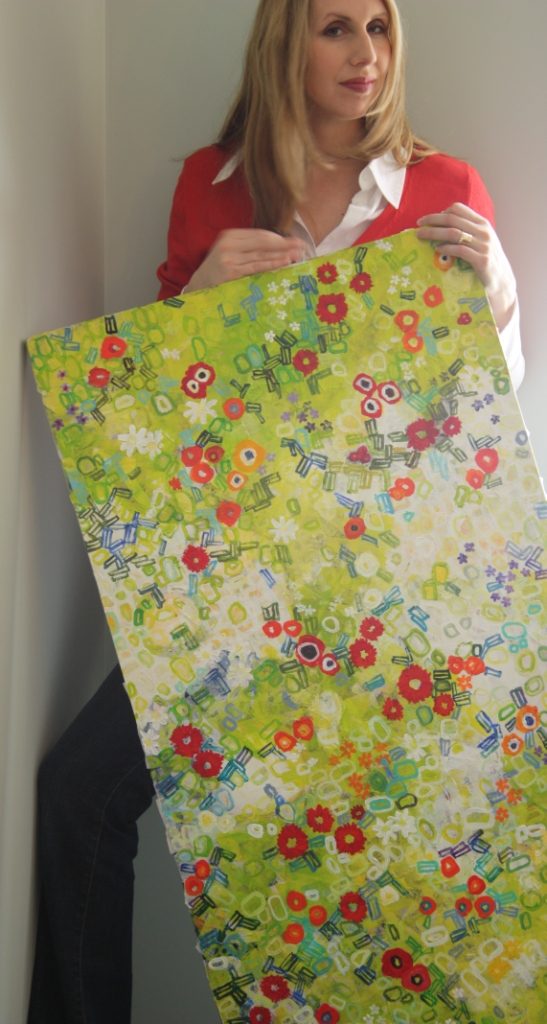
My medical missions with Operation Smile compounded that sense of stewardship. I worked with a young man once who was 17. The surgeons had just fixed his cleft lip and I went to see him after surgery. He was crying and I wanted to make sure that something wasn’t wrong. So I asked one of the translators, “Can you ask him why he is crying?” And he explained he was happy, with his cleft lip repaired, because now someone would marry him. A simple surgery that cost $250 to do. His family just never had that kind of money. His sense of self changed dramatically with just this one hour procedure.
A ten year old boy Sammy, in Kenya, wrote me a message on the small white board, thanking Operation Smile for operating on his burns “because now my enemies won’t be able to tease me any more”. It really gave me pause to think about his life and what he had been through. You can’t forget things like that.
A dad I worked with in Morocco asked me if I had an extra book he could give to his son. They were Berber, nomadic people. “We don’t have schools where we are and I feel really bad about it,” he told me through the translator, “but this is our livelihood. I have to feed my family, but it makes me sad for my son.”
I come back from these experiences and I can’t sleep at night. How do I reconcile living in a world that has so much, where all my needs are met? I’ve come to the conclusion that paying tithing is just the baseline, but then it is the stuff you give beyond that that really demonstrates where your heart is.
I actively try to incorporate service as a part of our family culture, and my boys hear me talk about the medical missions a lot. Now my three boys are 9, 4, and 2 years old. There are some really great books we use in our family: A Life Like Mine and Children Just Like Me, for example, which really show what it’s like to live in different countries. I love reading those with my boys so they can understand that a lot of kids have to work or have to walk to get water for their family or don’t have access to education. Just help them get out of the microcosm bubble that we live in.
Kiva loans have been really fun for my family. [Kiva.com is the “world’s first person-to-person micro-lending website, empowering individuals to lend to unique entrepreneurs around the globe”.] We look at the list of entrepreneurs who are requesting loans and we decide what loans to fund. For instance, my husband played the accordion as a child and recently we found a man through Kiva who wanted to expand his accordion business. We had to fund that loan! There was another guy who had an aquarium and fish business and my 9-year-old son loves fish… The great thing about Kiva is that such little amounts of money will go such a long way, so my kids can really feel like they’re making a difference.
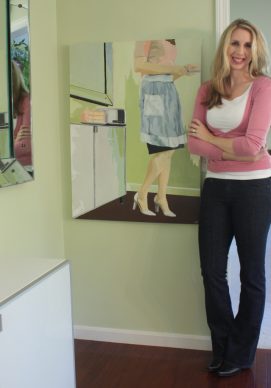
One thing we do is, when school supplies go on sale, we stock up on those we send them to Operation International Children which distributes them to school kids wherever the U.S. has a military presence. Again, this is something so simple that gets such a powerful point across to my kids: I say, “Look, you guys love to draw. Don’t you think other kids like to draw too? They don’t have reams of paper lying around at home and lots of markers like we do. So let’s do what we can to give them the same opportunities.”
We try to be active in volunteerism. We also do work with our food bank, town educational foundation, and the boys’ schools. We gather and donate medical supplies and unused medications to a local free clinic though our town health department. It’s rewarding to see my sons becoming passionate about it. My boys always ask to add donations from their own banks and tooth fairy money to the Perpetual Education Fund and the Church’s Humanitarian Aid.
A key to making this all work is to talk about why we do these things and why we believe it’s important. We talk with them about how we can’t wait until they get older and we can take them to see all the amazing things these countries and cultures have to offer. Because of my medical missions and my work as a child life specialist, am I very sensitive to people’s attitudes around poverty and service. I’ve seen so many people point at a charity organization and say, “Oh look, we’re helping the poor people. Oh, we’re helping the sick children.” I feel that’s not the right attitude. Instead, we should look at all the richness and greatness that these people have in their lives. They are vibrant, they are creative, and we can simply help by providing more opportunities. I want my boys to see real cultural flavor in the world, not just tour the cathedrals of Europe.
Seeing as my paintings fund much of the service that we do, my boys get excited when I’m painting because they know that means we’ll get to do a project we’ve been planning. Funding our projects is an integral part of our family budget. I talk about money when I’m at the store with the boys: “Let’s weigh this out,” I say. “How important is it to you to have another pair of jeans when some kids only have one set of clothes?” Some people may say that’s making my kids feel guilty, but I think keeping those questions always in your mind when you are at the store and throwing stuff in your cart is important. I constantly ask myself, Can I use this money in a better way?
I think so many women struggle with trying to feel important or feel worthwhile. I get such a tremendously rewarding feeling when I do little things every day that make a difference. Whether it is for my child, whether it is for a friend, whether it is for someone halfway around the world…. You go to bed at night thinking, “You know, I might not be perfect but I did something good today, I created good things. I did something worthwhile.” I think it is a very psychologically protective thing to look for and find ways that you are making a difference.
What do you think LDS women could do differently to have more of this sense of worth and fulfillment in their lives?
We emphasize service and education in our church doctrine — “The glory of God is intelligence” and all that — but for some reason there is a disconnect. We talk a lot about our roles as women and mothers but not always about how our individual talents fit into that. A woman can be a mom, but if she has education and skills and passions she can be mom to the tenth power.
I think we need to focus less on the superficial. For me my sense of self-worth is not caught up in how I look, it’s in the things that I do. The power is in what we chose to make of ourselves.
We need to do a better job of showing our girls how much they can do with their lives even if they are home with children. I think a lot of it is just building that more into our culture. For me, being a child life specialist blends perfectly with being a mom, so does being an artist. I am such a better wife and mother because of the knowledge and experiences I have had. I am 33 and I have a lot of years ahead of me. What am I going to do over the next 60 years? I hope a lot of amazing things. I think sometimes we don’t always take that long term view. I don’t know if we are done having kids yet or not, but if I am done, then in a few years my boys will be in school and then they will be on missions and then college and gone… and I still have a lot of years that I want to be vibrant and rich and full of rewarding and useful things. I want to look back and say I used up my life in the cause of good things. There is incredible satisfaction in being useful.
At A Glance
Leslie Graff
 Location: Sutton, MA
Location: Sutton, MA
Age: 33
Marital status: Married 11 great years
Children: Three boys (9, 4 and 2)
Occupation: Mother, Artist, Child Life Specialist
Schools Attended: Brigham Young University (B.S., M.S.)
Languages Spoken at Home: English
Favorite Hymn: “High On A Mountain Top”
Current Church Calling: early morning Seminary teacher
On the Web: www.lesliegraff.com and www.smartmama.blogspot.com
Interview by Neylan McBaine. Photos by Leslie Graff.
At A Glance
